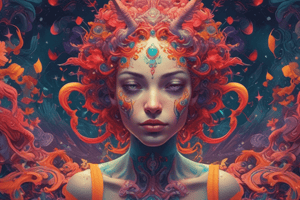Podcast
Questions and Answers
¿Qué característica principal distingue a los mitos y leyendas de otras formas de creación literaria?
¿Qué característica principal distingue a los mitos y leyendas de otras formas de creación literaria?
- Se centran en enseñar lecciones morales
- Están escritos en forma de poemas
- No tienen elementos comunes con la vida cotidiana
- Incluyen seres y mundos sobrenaturales (correct)
¿Cuál es el propósito principal de las fábulas como forma literaria?
¿Cuál es el propósito principal de las fábulas como forma literaria?
- Explorar la psicología humana en profundidad
- Narrar hazañas heroicas de dioses y semidioses
- Ilustrar verdades o lecciones morales (correct)
- Preservar las costumbres antiguas de una sociedad
¿Qué papel juegan las canciones en la literatura según el texto?
¿Qué papel juegan las canciones en la literatura según el texto?
- Nunca han sido utilizadas para transmitir mensajes importantes
- Capturan la imaginación humana y transmiten sabiduría a través de las generaciones (correct)
- Suelen basarse en hechos históricos reales para ser consideradas literatura
- Son solo entretenimiento sin ningún valor educativo
¿Qué tienen en común los mitos, leyendas, fábulas, proverbios y canciones según el texto?
¿Qué tienen en común los mitos, leyendas, fábulas, proverbios y canciones según el texto?
¿Qué distingue a las leyendas de los mitos según el texto proporcionado?
¿Qué distingue a las leyendas de los mitos según el texto proporcionado?
¿Qué tipo de enseñanza se destaca por su brevedad y uso de comparaciones en la vida cotidiana?
¿Qué tipo de enseñanza se destaca por su brevedad y uso de comparaciones en la vida cotidiana?
¿Cuál es un tema comúnmente abordado en las canciones tradicionales?
¿Cuál es un tema comúnmente abordado en las canciones tradicionales?
¿Qué comparten los mitos, las fábulas y las canciones en cuanto a su capacidad para cautivar al público?
¿Qué comparten los mitos, las fábulas y las canciones en cuanto a su capacidad para cautivar al público?
¿Por qué son considerados los proverbios herramientas ideales para transmitir sabiduría rápidamente?
¿Por qué son considerados los proverbios herramientas ideales para transmitir sabiduría rápidamente?
Flashcards are hidden until you start studying
Study Notes
Literary Creations: Myths, Legends, Fables, Proverbs, Songs
Literature is rich with stories that have stood the test of time through various mediums and cultural traditions. These tales can take many forms, from ancient oral traditions told around campfires to written works intended to educate and entertain readers. Here we explore five types of literary creations that capture the human imagination and convey wisdom and meaning across generations: myths, legends, fables, proverbs, and songs.
Myths & Legends
Myths and legends serve as foundational narratives within societies, often featuring supernatural beings and realms beyond our understanding. They are passed down orally over centuries, evolving with each retelling yet maintaining core elements that reflect shared values and beliefs. For example, Greek mythology tells of gods and heroes who struggle against monsters and other adversaries; Norse sagas describe the exploits of deities like Thor and Odin; and Native American folklore includes trickster figures who teach valuable lessons through their antics.
Fables
Fables are short narrative poems or stories used to illustrate moral truths or lessons. They often feature talking animals or anthropomorphic creatures in order to make abstract concepts more relatable. Aesop's Fables—an ancient collection of stories attributed to the mythical figure Aesop—is one of the most well-known examples, containing timeless messages such as "look before you leap," "slow and steady wins the race," and "two wrongs don't make a right."
Proverbs
Proverbs are brief, sayings conveying practical truths, often using comparisons drawn from everyday life experiences. They are similar to fables in their brevity and ease of memorization, making them ideal tools for imparting wisdom quickly and effectively. Some famous proverbs include "actions speak louder than words," "every cloud has its silver lining," and "you cannot have your cake and eat it too."
Songs
Songs may seem less related to literature since they focus primarily on musical expression rather than storytelling. However, song lyrics frequently draw upon poetic devices and metaphor to create vivid images that resonate deeply with listeners. Many traditional folk songs carry historical significance by documenting events, customs, and emotions of different cultures throughout history. Additionally, modern pop and rock music incorporate elements of poetry into their lyrics, giving rise to artistically significant pieces that double as songs.
In conclusion, these diverse genres of literary creation continue to captivate audiences worldwide due to their ability to transport us out of ordinary reality and into extraordinary worlds filled with magic and mystery. Each type - whether it's a hero battling dragons in a myth, a rabbit tricking a snake in a fable, a wise man sharing his knowledge via proverb, or a sweet melody wrapping itself around your heart as you listen to a ballad - offers unique ways to engage with themes universal yet personal, ancient yet alive.
Studying That Suits You
Use AI to generate personalized quizzes and flashcards to suit your learning preferences.




